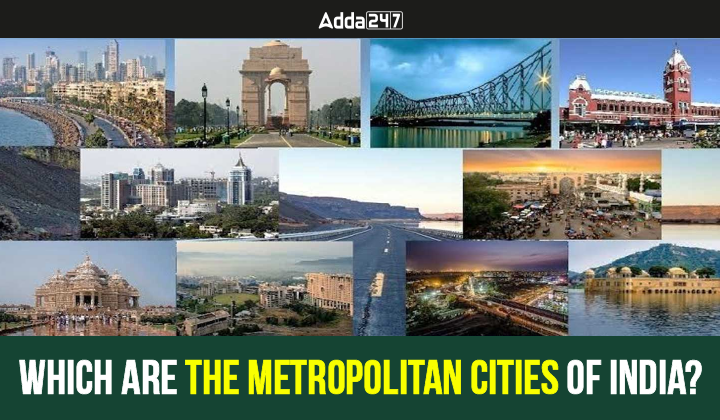Table of Contents
Metropolitan Cities are significant urban centres and developmental hubs with high population density, highly developed infrastructure and high-end economic activities. This article will throw light on the metropolitan cities of India. Having knowledge about the same is important for cracking the General Knowledge and Current Affairs sections in various government examinations.
Define Metropolitan City
A metropolitan city is an area with a population of 10 lahks or 1 million or more. It is divided into one or more districts and comprises two or more Municipalities, Panchayats, or other contiguous territories. The term ‘metropolitan’ has been derived from a Latin word meaning free city.
What are the Indian Metropolitan Cities?
Delhi, Bangalore, Kolkata, Chennai, Mumbai, Hyderabad, Ahmedabad, Pune, and Surat are among India’s metropolitan cities. Nine metropolitan cities in India are noted for their fast-paced lifestyles and urban populations.
According to the Census Commission of India, Indian cities with a population that exceeds four million people are categorized as Metropolitan Cities of India.
Metropolitan Cities of India
India is the world’s most populous country, the seventh-largest country in terms of land area, and the biggest democratic nation. India’s metropolitan cities are densely inhabited and play an important role in the country’s economy.
Many people have flocked to major metropolitan cities in quest of jobs and a better way of life over the years. Mumbai, Pune, Delhi, Ahmedabad, Surat, Chennai, Kolkata, Bangalore, and Hyderabad are India’s nine major cities, each with a population of over four million people.
Mumbai has a population of roughly 18 million people, Delhi with 16 million people, and Kolkata with 14 million.
The Metropolitan Cities of India List
Given below in a tabulated form is a list of the Indian cities, the states they belong to and their approximate population.
| Metropolitan Cities of India | ||
| Metropolitan City | State | Population |
| Mumbai | Maharashtra | 18 million |
| Delhi | Delhi | 16 million |
| Kolkata | West Bengal | 14 million |
| Chennai | Tamil Nadu | 8.6 million |
| Bangalore | Karnataka | 8.5 million |
| Ahmedabad | Gujarat | 6.3 million |
| Hyderabad | Telangana | 7.6 million |
| Pune | Maharashtra | 5.05 million |
| Surat | Gujarat | 4.5 million |
Importance of Residing in a Metropolitan City
There are various benefits of staying in a metropolitan city in India. Some of them have been enumerated below:
- Real estate investment market supply and demand – One of the key benefits of investing in a metropolitan area is the higher demand generated by this type of location. Furthermore, there is a plentiful supply of homes, bungalows, and villas in which one can reside. When relocating to a metro city from another city, there are numerous housing options to consider.
- Social infrastructure that is well-built – Public amenities, safety & security, health, and education are all important components of social infrastructure. The country’s major cities have great hospitals, a significant number of schools, and busy, safe areas. Furthermore, only in these urban regions can one find lavish shopping malls, social clubs, and fine restaurants.
- Transportation and connectivity – Metro trains and rails enable access to every section of the city and to key places. Apart from this, India’s transport infrastructure is great, and it is more developed in metropolitan cities.
- Opportunities for Employment – The availability of jobs is one of the key motivators for many people to relocate to metro cities. A person can acquire work and advance their career in a big metropolis.



 IIT Roorkee Assistant Professor Recruitm...
IIT Roorkee Assistant Professor Recruitm...
 IIIT Bhopal Teaching Recruitment 2025 ou...
IIIT Bhopal Teaching Recruitment 2025 ou...
 AP SET Notification 2026 Out, Check Elig...
AP SET Notification 2026 Out, Check Elig...












